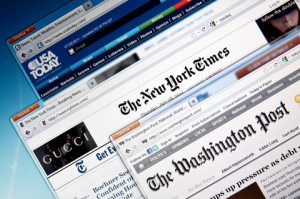 And Can I Finish This Blog Post Before My Fiance Goes to Bed?
And Can I Finish This Blog Post Before My Fiance Goes to Bed?
It seriously freaks me out when my fiance goes to bed before me. I have no idea why. He's just going to the next room and won't even completely close the day because the cat needs to be able to go in and out. But, I can't stand the notion of him asleep before me, with all of the lights out in the rest of the apartment. It's too much. I don't like it. When he shuts the light off by desk and I hear that 'click,' I start winding down as quickly as possible (not the right way to wind down, I know) so I can go to bed as soon as I can. It just feels late when he goes to bed before me and it feels like a sign I just shouldn't be up too much longer or else bad things will happen.
Anyway... Articles!
So, my first step to hustling is to get a record outside of our app and CMS of every article that we cover. We easily cover 400 stories a day: 20 to 30 stories per vertical plus another 100 or so for top news. No, I'm not going to read all 400 of those articles each day. That's not possible. But, a Google Sheet for each vertical with an easy glance at that day's 20 or 30 stories is much more digestible. With an easy glance of the source link and the description, I can pick out a couple of stories that look extra interesting or that look like they may have excellent facts, quotes or statistics that would make great social media content.
To build social media communities and, ultimately, fuel growth and get installs, our channels needs to present more online than what we're doing now. Our Twitter handles need to offer more than the lede sentence and the link to the update. The main handle needs to do more than tweet a lede and the original source link with the author tagged. All of that content is great, but because it's not much different from what's offered in the apps, there's little value in both downloading the app(s) and in following us on social media. Sure, someone may miss the story on the app and then catch on Twitter, or vice versa, but even that's kind of a poor value proposition. A major factor in making social media work for you is to have content tailored to the platform, where even though we're sharing the same story across Facebook, Twitter on our app, it should not look identical across the three platforms.
Separate Content for Our Newsletter
With the stories in a Google Sheet, I can avoid looking at the updates directly to have a fresh interpretation of the articles. A fresh interpretation is needed for our upcoming newsletter, although I do not know exactly the contents of this newsletter. I sent a survey to our mailing list since we haven't emailed them in over a year (hey, it wasn't my list to begin with, so I didn't have any idea who was on this list or why they were there). This survey asked how often they'd like the newsletter, what they would like it in and why they signed up in the first place. From the responses I've received, it's looking like this will be a weekly email that features summaries of our top stories. To be able to put such a newsletter together, I need to know everything we've covered for the week and then decide our top drones story, our top video games and a couple of our top breaking stories etc.
Getting this done shouldn't be a problem. The next step now is learning first-hand how many articles I can peruse in a given amount of time. Today, I'm going to give myself one hour and see how many articles I can get through. The day afterward, I may do 90 minutes or two hours, depending on my schedule and how well today goes. The goal is to see if this is a viable solution to a) finding great social media content in the stories we already cover and b) useful in finding ideas to cover for the upcoming newsletter.
If it doesn't work, then I'm not sure what I would do. At the moment, I need to be able to do this on my own.









